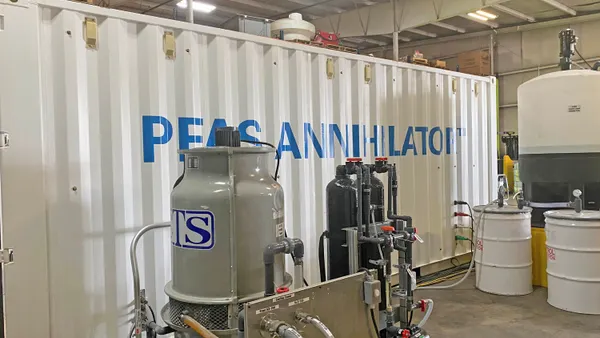Dive Brief:
- The state of Maine is suing a host of manufacturers, including 3M and DuPont, alleging the companies knowingly promoted and sold products containing harmful per- and polyfluoroakyl, or PFAS, chemicals.
- Maine Attorney General Aaron Frey filed two lawsuits against more than a dozen defendants, accusing them of contaminating the state's natural resources with “forever chemicals,” known for their slow breakdown in the environment and humans.
- Maine is seeking compensatory damages, including those related to the restoration of its natural resources and investigation costs, treatment and removal of PFAS contamination, as well as punitive damages.
Dive Insight:
The lawsuits add to a growing list of states suing chemical manufacturers that produce PFAS, alleging they contaminate a state’s natural resources and put residents at increased risk. Kentucky filed a lawsuit on April 6 against DuPont, along with two of its affiliates, accusing the companies of tainting Kentucky’s water with PFAS.
Maine officials have taken multiple steps in a bid to eliminate PFAS from within its borders. In addition to setting drinking water standards, the state established PFAS screening levels in soil, fish tissues, beef and milk that were updated a year ago. It also created wastewater sludge testing requirements for PFAS contamination of land and groundwater, and banned the use of PFAS from household products, including carpets, rugs, and fabric treatments.
And as of Jan. 1, Maine now requires manufacturers to report products with intentionally added PFAS to the state.
“The defendant manufacturers have willfully introduced toxic chemicals into Maine’s environment in pursuit of profit for shareholders,” Frey said in a statement. “Maine citizens and the State are left to manage the harm these chemicals cause in our natural resources, our animals, our food, and our bodies, and the State is working overtime to manage the fallout. PFAS manufacturers must account for the environmental, health and economic damage caused by their actions.”
Without remediation for cleaning up PFAS, they would continue to spread throughout Maine, the state claimed in its lawsuit filing.
The state, however, has yet to specify the exact amount of monetary damages it is seeking. Due to the ongoing nature of the suit, “the number changes by the minute,” Danna Hayes, special assistant to the state attorney general, said in an email.
“Due to [the] ongoing nature of the State’s discovery and mitigation of PFAS in our environment, the costs of resolving this crisis grow daily,” Hayes said. “As such, we have not put a figure on the current costs.”
Federal authorities have also begun taking a more hands-on approach to regulating PFAS and aiding states in their pursuit to rid them from their environments. In February, Maine received nearly $19 million from the EPA through the Bipartisan Infrastructure Law to address contaminants in drinking water, such as PFAS.
Maine’s lawsuit was filed shortly after the Environmental Protection Agency released a proposal on March 14 to address PFAS contamination in drinking water as part of the Biden administration's goal to combat PFAS pollution nationwide.











